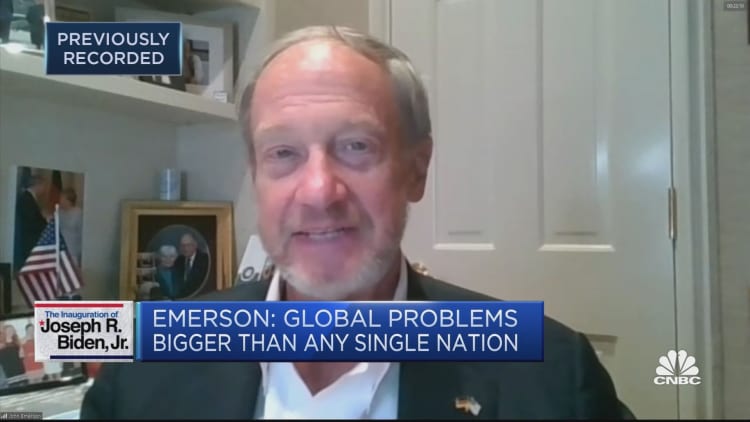President Joe Biden spoke with Chinese President Xi Jinping by phone Wednesday evening for the first time since taking office, according to the White House.
According to a White House statement, Biden raised his "fundamental concerns" about Beijing's "coercive and unfair economic practices, crackdown in Hong Kong, human rights abuses in Xinjiang, and increasingly assertive actions in the region, including toward Taiwan."
The statement said the two leaders also discussed countering the Covid-19 pandemic, and "the shared challenges of global health security, climate change, and preventing weapons proliferation."
Officials said Biden also planned to express his hopes the two leaders could cooperate on issues such as nuclear nonproliferation and climate change.
The president does not plan at this time to lift tariffs on China that were imposed by the Trump administration, senior administration officials said in advance of the call, and he is unlikely to reduce the U.S. military presence in Asia as former President Donald Trump had threatened to do during his time in office.
The call between the leaders of the world's two largest economies, coming three weeks after Biden's inauguration, follows a review of core elements of U.S. policy toward China during the Trump administration and extensive consultation with America's allies, the officials said. One of them described Biden as now "in a strong position" to have a substantive conversation with Xi.
More from NBC News:
Biden admin to name refugee advocate director of task force to reunite separated families, say sources
Myanmar protesters rally against military coup for fifth day after protester shot
Loujain al-Hathloul, Saudi women's rights activist, released from prison
Officials said the phone call was aimed at signaling a new U.S. strategy that maintains a core tenet of the Trump administration's policy — intense competition — but employs a dramatically different approach.
"We looked at what the Trump administration did over four years and found merit in the basic proposition of the an intense strategic competition with China and the need for us to engage in that vigorously, systematically across every instrument of our government and every instrument of our power," one senior administration official said. "But we found deep problems with the way in which the Trump administration went about that competition."
Officials said one difference in Biden's approach will be an emphasis on engaging with U.S. allies, both in Europe and in the Asia Pacific. Biden is expected, for instance, to attend international forums for countries in the region, such as the Association of Southeast Asian Nations and the East Asia Summit, though it's unclear if his appearance would be virtual given the pandemic. Former President Obama regularly attended the ASEAN summit, for instance, though Trump skipped it after his first year in office.

A second senior administration official said America's partners in Asia have expressed concerns about recent U.S. actions, including the unpredictability of the Trump administration and "weird interactions with North Korea."
Officials were also adamant that Biden's China policy is not a continuation of Trump's, saying he wasn't criticizing the toughness of his predecessor's approach to China but rather "that he was doing so alone while also fighting our allies and partners."
The review of U.S. policy on China is continuing in several areas, including a Pentagon effort announced Wednesday and a study of the Trump administration's tariffs.
Biden will make a decision on tariffs after extensive consultation with agencies across his administration and with U.S. partners in Asia and Europe — something a senior administration official said "is going to take some time."
"There will be changes to the trade policy towards China," the official said. "And in the meantime we are not lifting the tariffs."
Among the policies the Biden administration plans to continue from the Trump administration is further restricting China's access to certain types of sensitive technology, though officials said new restrictions on such exports would be done in concert with U.S. allies.
Officials said Biden did not plan to raise the issue of Beijing hosting the 2022 Olympics.
Biden first got to know Xi as vice president at a time when it was clear Xi would rise to the presidency. A senior administration official said Biden went into the phone call "practical, hard-headed, clear-eyed."
"He obviously has spent a lot of time with Xi Jinping over the years," one of the senior administration official said of Biden. "The two leaders know each other very well."
The strategy Biden plans to adopt on China, the official said, "will play out not over the course of days or weeks or even months, it will play out over the course of years."
"That doesn't mean there isn't urgency," said the official. "There is urgency and we are acting urgently. But it also means that we need to stick with this, and we need to play the long game."

